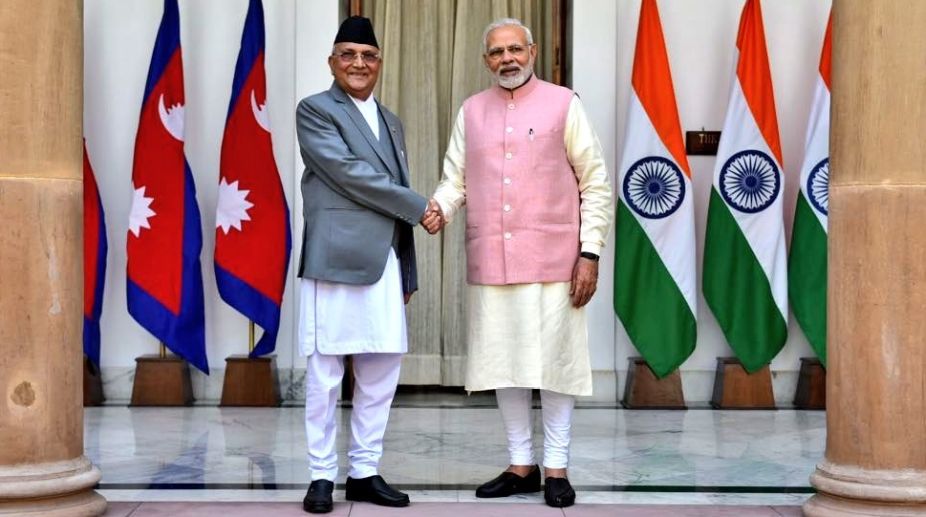Nepal’s Prime Minister, Mr KP Oli’s recent visit to India was a success. After the downturn in the relations between the two countries, his decision to visit India as his first port of call after assuming office as Prime Minister ~ for the second time ~ was much appreciated in Delhi.
There was considerable focus on connectivity projects and economic cooperation between the two countries. This is only very imperative given the significant movement of people between the two countries and the development challenges that the two countries confront.
Advertisement
Mr Oli’s speech at the civic reception, organised by the India Foundation and Nehru Memorial Museum and Library, merits a close reading. He presented a detailed exposition of the principles and values that will guide his government’s foreign policy.
For instance, he referred to the principles of Panchsheel as the leitmotif of his foreign policy. Specifically, he emphasised the potential of Asian values in fostering closer relations between the Asian countries and in contributing “to the world’s better future.”
It is well-known that China was one of the principal players in initiating a conversation on the Asian values. Therefore, some in India may see Mr Oli’s celebration of Asian values as a declaration of allegiance or as growing ideological congruity with China. His use of the metaphor “Long March” to describe the success and prosperity of Asia may reinforce the concerns regarding the Nepal government’s alleged tilt towards the northern neighbour.
However, his views on Asian values require much deeper reflection.
In course of his speech, he briefly reflected on the contributions of Asian civilisations and also referred to the poverty and backwardness plaguing the continent for the past 200 years. He was right in his observation that Asia is increasingly becoming central to global geopolitics. Interestingly, he termed the rise of Asia as a ‘Renaissance’. In his reckoning, “Asia’s gain of supremacy is not a first-time phenomenon.”
The remarks of the Prime Minister on values presuppose the presence of a pan-Asian identity. Therefore, his comments need to be seen in the larger historical context surrounding pan-Asian identity. To a large extent, the concept of Asia is a consequence of the interactions between the European colonial powers and the local communities.
Not surprisingly, it was in the context of colonial exploitation that the concept of Asian solidarity was articulated and it brought together various newly independent states that demanded the hastening of the decolonisation process. The ideological divide, the territorial conflicts between Asian nations, and the successful decolonisation process ensured that the concepts based on pan-Asian identities faded out of public imagination during the Cold War.
However, the concept of Asian values came to the forefront after the end of the Cold War during the World Conference on Human Rights in Vienna in 1993. Some of the non-democratic Asian regimes, such as China, argued that the “value-foundations” of their societies are different from those enshrined in the Universal Declaration of Human Rights and hence they cannot be judged on the basis of the latter. In the 1990s the proponents of Asian values focused more on this difference and fending-off unwarranted scrutiny on human rights issues.
In the recent past, the concept of Asian values has gained prominence again because of rapid economic development of some of the East Asian countries. Specifically, the fact that China was able to register stupendous economic growth without adopting Western political institutions strengthened arguments in favour of Asian values. This celebration of the alleged causal linkage between Asian values and prosperity can also be noticed in Mr Oli’s speech.
But what are these Asian values? For Mr Oli, “universal fraternity, peaceful co-existence, respect for diversity and sense of equality” constitute important Asian values. However, there is nothing uniquely Asian about these values, as ‘peace’ and ‘equality’ figure in the Universal Declaration of Human Rights as well.
Interestingly, for Mr Oli, the foundations of these Asian values are premised on “harmony, discipline and primacy of the larger public good and interest over petty individual self-centeredness.” Quite often values such as ‘discipline’ are deployed to suggest the primacy of state action over individual rights or to suggest the need for greater individual subservience to the directions from the state.
On the other hand, it can be argued that the value of ‘discipline’ implemented in full measure would result in constraints on the arbitrary deployment of power by the state, which is also one of the core principles of liberalism.
Similarly, the celebration of the value of ‘diversity’ implies not merely respecting diverse political regimes but also ensuring that diverse social groups get appropriate representation within the political system.
If the concept of Asian values in its very articulation questions the existence of universal values, then it would require greater reflection as to how a large geographic space such as Asia, with civilisational diversity, can have a unique set of common values.
It would be interesting to observe how the present Nepal government will deploy these values in operationalising infrastructure connectivity projects. By referring to Asian values, Mr Oli located Nepal in the larger Asian geopolitics.
For the Prime Minister, Nepal is not just a country that is sandwiched between India and China but is part of the larger Asian growth story. By calling for ‘promotion and institutionalisation of the Asian values’, he indicated Nepal’s willingness to play a proactive role in the creation of new frameworks aimed at strengthening such principles. The Government of India and its officials should pay close attention to Mr Oli’s views on values and foreign policy as it hints at the possible emergence of new institutional frameworks for Asia.
The writer is a Senior Fellow at the Nehru Memorial Museum and Library, New Delhi. The views expressed are personal











